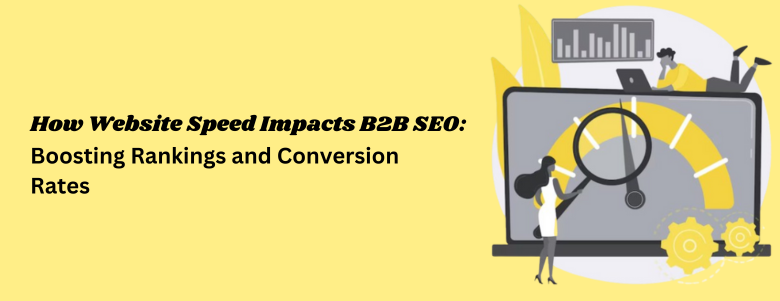Table of Contents
- Introduction
- The Relationship Between Website Speed and SEO
- 1. Improved User Experience
- 2. Mobile-First Indexing and Speed
- 3. Core Web Vitals and Google’s Algorithm Updates
- How Website Speed Boosts Conversion Rates
- 1. Reduced Bounce Rates
- 2. Enhanced User Engagement
- 3. Increased Trust and Credibility
- Optimizing for Speed: Key Strategies
- 1. Choose Fast and Secure Web Hosting
- 2. Optimize Images and Media
- 3. Use a Content Delivery Network (CDN)
- 4. Minimize HTTP Requests
- 5. Leverage Browser Caching
- Conclusion
- FAQs
How Website Speed Impacts B2B SEO: Boosting Rankings and Conversion Rates.
If you want to grow in the digital era, especially for SaaS brands, page speed is the most critical factor. Poor page speed will not only affect your SEO ranking but also prevent conversions. Whether you’re an individual business or working with the Best SEO services provider company, improving your website speed is essential for success. In this blog, I will help you understand how page speed impacts SEO and conversions and share some tools and tips for optimizing your website performance.
The Relationship Between Website Speed and SEO
Search engines—especially Google—take into account a lot of different factors in ranking websites. Among these, the loading speed of websites is especially important. Having a website that loads fast not only improves the user experience but also tells search engines that your website is efficient and well optimized.
Here’s how a speedy website influences your SEO efforts:
1. Improved User Experience
One of the most crucial factors influencing user experience on a website is its speed. Visitors who leave a page before it’s fully displayed have a higher bounce rate, which happens when the page takes too long to load. Search engines like Google weigh these signals and could rank slower websites lower than their rivals. A sluggish website might make prospective consumers very quickly lose interest in a company. For B2B companies, who often depend on websites to present comprehensive information, case studies, and product descriptions, this is especially true. Ensuring fast loading of your website increases the likelihood of acquiring leads or clients and helps sustain their interest.
2. Mobile-First Indexing and Speed
Google mostly indexes and ranks websites using the mobile version of their content with its transition to mobile-first indexing. Mobile consumers, particularly in business-to-business settings, have a high demand for speed and efficiency. When viewed on mobile devices, websites that load slowly can result in bad user experiences and worse rankings. So, maximizing speed on all devices—especially mobile—is crucial.
3. Core Web Vitals and Google’s Algorithm Updates
Core Web Vitals is a set of metrics that Google released in recent years. These metrics evaluate the quality of the user experience based on the speed of the page, the presence of interactivity, and the stability of the visuals. Should your website fall short of these performance standards, search results could incur a penalty. Meeting these criteria is crucial for B2B companies, where competition for exposure in search results is intense, especially if they want to remain relevant. Google’s Helpful Content Update emphasizes that material that is of good quality, loads quickly, and satisfies user intent will always rank higher. Focusing on page speed helps companies meet these algorithmic expectations while maintaining a competitive edge over rivals.
How Website Speed Boosts Conversion Rates
In the B2B sector, where every second of delay could mean the loss of a possible high-value client, the influence of website performance on conversion rates is particularly important. Studies repeatedly find that faster websites increase conversion rates successfully. The reasons are as follows:
1. Reduced Bounce Rates
A website that loads slowly can discourage visitors from using it, which is especially detrimental in the B2B sector, where decision-makers are looking for efficiency. Research shows that up to 53% of mobile users will leave a website if it takes more than three seconds to load. Reducing load speeds keeps users on your page longer, therefore lowering bounce rates and raising the possibility of interaction.
2. Enhanced User Engagement
A faster website not only keeps visitors on your page but also motivates them to explore your website further. Your website provides you with an increased number of opportunities to convert visitors into paying clients the longer they remain on your site. It is essential for B2B websites to load quickly to provide customers with the most seamless experience possible. These websites are frequently packed with product catalogs, whitepapers, and detailed service offerings. No matter how good the slow-loading material is, it will not satisfy users who grow bored and abandon the site before interacting.
3. Increased Trust and Credibility
Trust is absolutely vital in the B2B market. Companies seeking trustworthy partners will assess your professionalism depending on many criteria, including website performance. A slow, unresponsive website might convey a sense of unreliability. Conversely, a fast-loading, well-optimized website shows that your organization respects effectiveness and can be relied upon as a business partner.
Optimizing for Speed: Key Strategies
Increasing the performance of a website requires a combination of improvements to the website’s technical aspects and constant optimization. These techniques should enable B2B companies to increase website speed, therefore enhancing SEO results and conversion rates.
1. Choose Fast and Secure Web Hosting
A dependable hosting service is the cornerstone of every website that loads quickly. Choosing a service with fast and secure web hosting can help greatly enhance website performance. A high-performance hosting service guarantees that your server can withstand surges in internet traffic without causing your website to become less responsive. Apart from speed, security is vital for safeguarding private B2B information, which is why the hosting decision becomes even more significant.
2. Optimize Images and Media
The loading time of a website can be greatly slowed down by large image files. Businesses can cut load times without compromising quality by compressing photos and optimizing them. Optimizing media content will significantly affect website speed in the B2B sector, where visual presentations, product images, and infographics are quite prevalent.
3. Use a Content Delivery Network (CDN)
A CDN keeps copies of the material from your website scattered over several places worldwide. This lowers latency and improves load times by letting users access your website from a server located physically nearer to them. Using a CDN would especially help B2B enterprises with overseas customers guarantee quick access for consumers worldwide.
4. Minimize HTTP Requests
Every time a webpage loads, it makes HTTP requests to acquire various elements—e.g., images, scripts, and stylesheets. A web page loads slower the more requests it generates. Reducing HTTP requests—by consolidating several stylesheets or cutting scripts—allows companies to speed up their websites.
5. Leverage Browser Caching
Static components of your website are stored on a user’s device through browser caching, therefore saving them from being reloaded each time the user visits the site. In the B2B market, where decision-makers may return to your website numerous times before making a purchase decision, this can drastically cut load times for repeat users.
Conclusion
In today’s competitive digital landscape, especially for B2B companies, optimizing website speed is crucial not only for improving search engine rankings but also for increasing conversion rates. A fast website ensures a seamless user experience, builds trust, and enhances credibility. By leveraging strategies such as fast web hosting, image optimization, and CDN implementation, you can significantly improve your website’s performance. Every second counts when it comes to attracting and retaining potential clients. Prioritizing website speed will not only help you meet Google’s algorithm requirements but also position your business for long-term success.
1. How does website speed directly impact SEO rankings?
- 1. How does website speed directly impact SEO rankings?Website speed is a critical factor in SEO because it affects user experience. Google considers page load time when determining rankings, meaning faster websites are more likely to rank higher. A slow website increases bounce rates, which can negatively affect your search ranking.
- 2. What are Core Web Vitals, and why are they important for SEO?Core Web Vitals are a set of metrics Google uses to measure user experience, focusing on load time, interactivity, and visual stability. Meeting these performance standards is essential for improving your website’s SEO ranking and maintaining a competitive edge.
- 3. How can slow website speed affect my conversion rates?A slow-loading website can lead to higher bounce rates, meaning visitors leave your site before it even fully loads. This can result in missed opportunities for lead generation and conversions, particularly in the B2B sector where efficiency is highly valued.
- 4. How does mobile-first indexing relate to website speed?With mobile-first indexing, Google primarily uses the mobile version of a website for ranking and indexing. If your mobile site loads slowly, it can hurt your rankings, as mobile users expect fast, seamless browsing experiences.
- 5. What are the best strategies to improve website speed?Some effective strategies include using a fast and secure web hosting service, optimizing images and media, implementing a content delivery network (CDN), reducing HTTP requests, and leveraging browser caching. These methods can significantly boost your website’s performance.
Author
-

Shweta Tiwari brings her expertise in marketing and a passion for clear, engaging communication to the world of digital content. With 5 years of experience, she excels at breaking down complex marketing strategies into easy-to-understand insights. Specializing in digital marketing trends and strategy development, Shweta helps businesses grow and adapt in today’s fast-paced digital landscape





